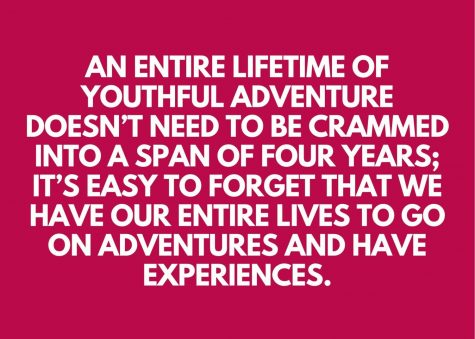High school probably isn’t going to be the best four years of your life, and that’s OK
February 7, 2020
We’ve all seen those movies — the ones with wistful scenes of young love and late night adventures. The teenagers in all these movies seem to live their lives with reckless abandon, forming a collection of memories painted with laughter and intense joy, paired with artfully crafted scenes of somewhat sophisticated nostalgia and sadness.
Conveniently, none of these kids have any homework. Or the SAT. Or college apps.
At one point or another, we’ve wished for our own coming-of-age movie. We’ve spent hours longing for our own epic stories and lovers — our own Annabeths, Damons, Archies. We go to school, come home and do homework, eat, rinse and repeat.
In the media, even these mundane activities are romanticized; the ordinary is made out to be extraordinary. But this is exactly the issue — we connect with these “relatable” characters, and believe that our lives can mirror theirs if we try hard enough. Realistically, though, most of us don’t spend our time crafting letters to all the boys we’ve loved before in between studying for AP exams. We don’t go on midnight road trips to chase paper towns after football practice.

We build up all these expectations for what our teenage years “should” look like based on what we’ve seen on TV or grown up reading, but our lives simply can’t live up to these expectations. We spend so much time expecting to solidify our identities in between creating memories that’ll last for a lifetime. And while, yes, some of us may have figured out our passions or interests, we probably didn’t find them in any particularly exciting way. And yes, some people may have fallen in love or created everlasting friendships, but some of us are left heartbroken or have drifted away from people we thought would be our best friends forever.
Some of us may have spent the majority of our teenage years battling different mental illnesses, an experience that is also vastly different from the romanticized sadness or anxiety we see on screen. According to LiveScience, one in five teens in the U.S. suffer from some kind of mental illness; for such people, they may spend their entire teenagehood in a haze, memories ridden with pain or nonexistent at all.
And that’s OK. An entire lifetime of youthful adventure doesn’t need to be crammed into a span of four years; it’s easy to forget that we have our entire lives to go on adventures and have experiences. Romanticization itself isn’t toxic or harmful. It’s when this romanticization leads to the buildup of unattainable expectations, a need to live the “best four years” of our lives in just four years.
There’s no timeline to adventure. It’s common knowledge that life isn’t an artfully crafted, scripted, and directed movie — so why do we expect ours to live up to the same standards? We’re all fighting our own battles, creating our own experiences that don’t reflect the problems teens on screen face; this is our coming of age experience. It’s messy and confusing and beautiful and human, and that’s OK.


















